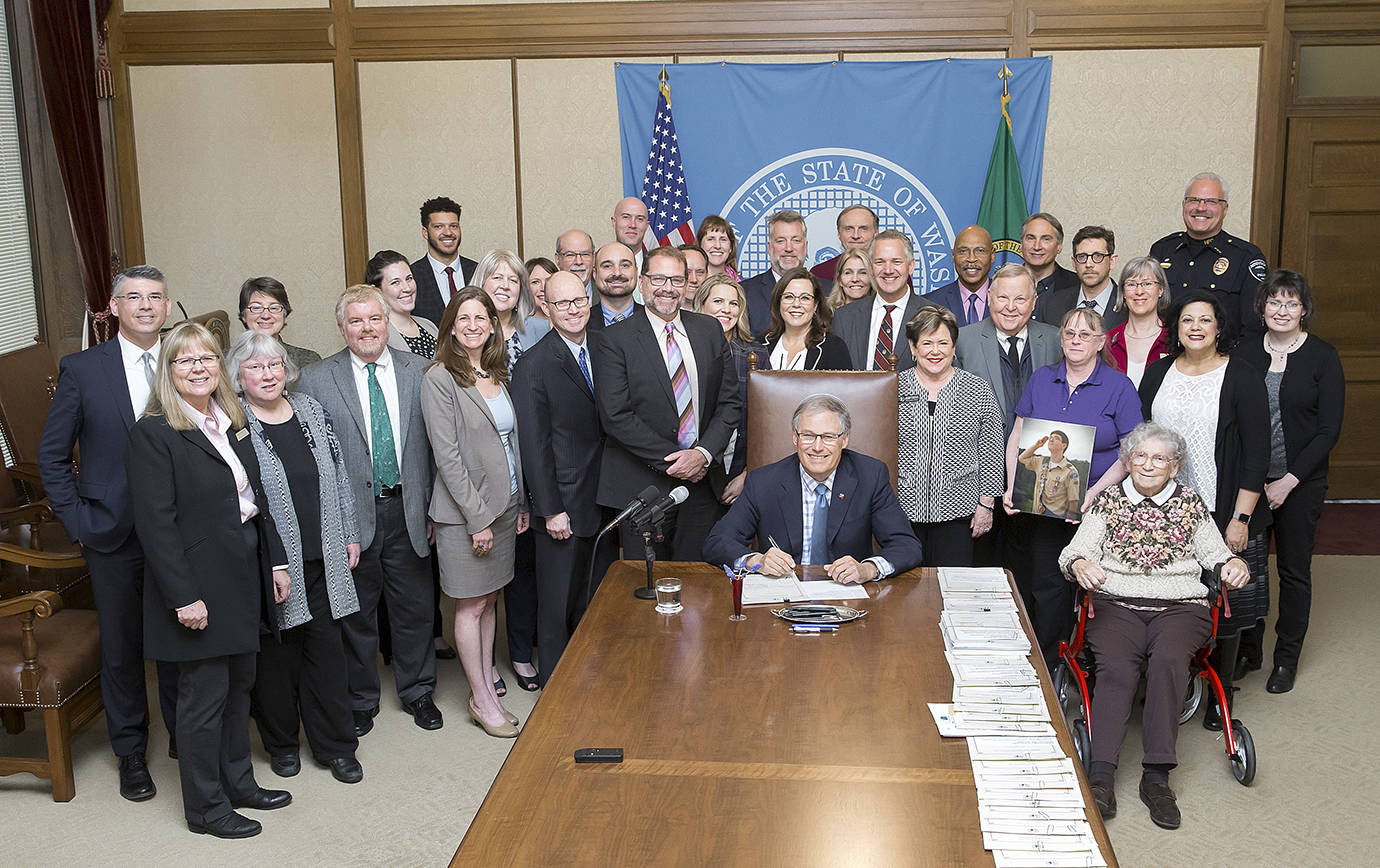Legislation signed by Gov. Jay Inslee Thursday created the nation’s first statewide, comprehensive drug take-back program to be financed and provided by pharmaceutical manufacturers that sell drugs in Washington state.
Hoquiam Police Chief Jeff Myers has been pushing for this type of legislation for several years and was at the bill signing. “The Hoquiam Police Department has the only full time drop box (where unused medication can be dropped and disposed of properly) in all of Grays Harbor County, which is around 2,000 square miles and 74,000 citizens,” said Myers. “This bill will support the disposal of the drugs we collect and will continue to collect in our drop box in the lobby, but also hopefully expand locations and opportunities for citizens all across our state.”
The Secure Drug Take-Back Act focuses on prevention, seeking to shut down the “drug dealer” in the home medicine cabinet that is a common starting place for medicine misuse and addiction. A majority of people who abuse prescription drugs obtain them from family and friends. In Washington state, overdose deaths have surpassed car accidents as the most common cause of accidental death. According to the Washington State Department of Health, of the almost 700 opioid overdose deaths in 2016, over 400 were attributed to prescription opioids.
Prescription drugs are not only related to overdose and abuse, they also contribute to accidental poisonings and suicides. In Washington, over 150 suicides were attributed to medications in 2015. Prescription drug accumulation in homes can also increase the possibility of accidental poisonings, often due to expired medication or ingestion by a child.
To reduce risks of drug abuse, overdoses, poisonings, and suicides, the Secure Drug Take Back Act requires drug manufacturers to implement a statewide program for the safe and secure collection of unused, expired, and leftover medications.
The system must operate on a year-round basis and offer convenient drop-off sites in cities and towns across the state. Any pharmacy, hospital, or police agency that volunteers to host a secure drug drop box must be included in the collection system financed by drug manufacturers. Prepaid return mailers will also be available to residents. Additionally, each program must develop a system of promotion, education, and public outreach about the safe storage and collection of pharmaceuticals.
Finding sustainable and adequate financing has been a key barrier to providing drug take-back services in every community in Washington state. Sheriff and police departments often provide drug drop boxes but have no dedicated funding to pay to dispose of the large amounts of medicines collected from community members.
Under the new law, pharmaceutical manufacturers will directly finance the drug take-back program. The annual cost of the drug take-back program is estimated to be about 0.1 percent of the $5.7 billion in sales that pharmaceutical companies make per year in Washington.
“So far, the Hoquiam Police Department has collected and safely destroyed over 3,300 pounds of unwanted medications. Up until the creation of this new program, (the department) has been covering the costs of the drug take back box and destruction of the medications,” said Myers. “I have had the honor of testifying and supporting this legislation for many years. It was an absolute pleasure to see it pass both the House and the Senate this session with such support.”
Gov. Inslee commented at the bill signing he had supported the creation of drug take back programs back when he was in Congress by getting the DEA to change rules to allow them.
Under the Secure Drug Take-Back Act, drug manufacturers whose medicines are sold in or into Washington State must submit a program proposal by July 1, 2019 explaining how they will provide a drug take-back program meeting the law’s requirements. The bill also defines earlier deadlines for when manufacturers must contact pharmacies, hospitals, law enforcement, and other potential medicine collectors of the opportunity to participate in their program by hosting a secure drug drop box. The Washington State Department of Health will review and approve the manufacturers’ proposals.


